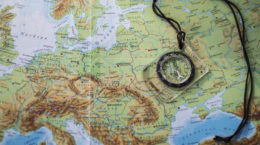Let’s speak honestly. Without hopes for 100500 billion EUR that the West will supposedly give us as soon as we get rid of Lukashenka to start a great life. Without hopes that somebody will give us the Khanty-Mansi AD when Russia collapses. Yet judging by the real state of our country and the whole region we live in.
We continue to examine different approaches which will allow to restore the growth of the Belarusian economy and give our country an opportunity to catch up with our far-advanced neighbours at an accelerated pace after Lukashenka and his “family” leave the heights of power. In today’s article we are going to speak about several complicated issues at the interface of politics, interests of the state, economy and social system.
The biggest disadvantage of both the political class and the society that political class represents is the disease of endless looking for simple solutions to complex problems. The Western political culture has almost outlived that phenomenon, unfortunately, very common for post-Soviet countries. Also, for some reason, “simple solutions to complex problems” in our country are mostly implemented in the economic sphere. Just remember Lukashenka with his “I’ll launch the plants” or “forbid to raise prices”.
Simple solutions create an illusion of solving a problem, although in fact they only aggravate it and make it worse. Lukashenka’s “launching of plants” resulted in preservation of the equipment and technologies of the 80s (instead of modernization), as well as in endless dependency on loans from Russia and China. Also, his ban to raise prices ended in destruction of commerce, reduction in the range of goods, and… in the subsequent price growth.
The Belarusian society should grow up and understand: there are no simple solutions to complicated problems. Nevertheless, for now, both the regime and the opposition prioritize the current political interest over the interests of future generations. The society is actively playing along with the politicians in that issue, although saying to understand that we should make decisions in the interests of those not born yet, of future generations the Constitution is talking about.
Do we want our children to have decent pensions at least? Yes, we do! However, in order to achieve that, we need to carry out real pension reform right now! Real reform with real sources of pension fundings, even if that is not a popular decision. Do we want our children and grandchildren to live in the EU? Yes, we do! What is needed to be done for that after the democracy wins? In particular, we need to unify our taxation and financial systems with the EU financial system, give up shadow schemes and tax evasion today.
Such solutions are needed a lot, but they are not popular. They are lowering the rating of those who suggest them. They do not fit into the traditional Belarusian desire not to make decisions and not to take up responsibility. It’s a paradox long-known to sociologists: Belarusians stand “for” economic reforms, but they want them to be carried out by someone else, they do not want to bear losses and suffer from reduced standard of living while those reforms are being implemented.
Thus, we move to another question of today: what kind of state should the state of the New Belarus be: “big” or “small”? There are two extremes of our politics and reforms that we are well aware of. It’s either a Leviathan state, penetrating all the spheres of the social and personal life, gathering tribute and taking over all the spheres of economy, or a primitively simplified “smartphone state”, a vulgar minarchism and elimination of the state out of the economy according to the principle “the less – the better”.
It seems that both those concepts are highly harmful for Belarus. There should be a two-factor model. On one hand, a state which is strong at the macro-level, capable of defending the domestic market, provide growth stimulus, export development and support, ready to gnaw out foreign markets and defend our own companies at the international level. Also, a strong state in the terms of safety and regulation of monopolies of financial industrial groups and transnational corporations.
On the other hand, a state which completely withdraws its regulation at the micro-level, ensuring maximum liberation of private initiative and entrepreneurship. Sort of an Indian dance, when simultaneously one hand is up “screwing in a bulb”, and the other hand is down “petting a dog”. By the way, almost all the countries that today are an example of successful reforms, used that model.
Contrary to what is needed, the Belarusian state today is excessively “strong” on the micro-level regulating and controlling everything and everyone, but, despite the rhetoric of the powerholders, it has become very weak at the macro-level giving up the economy of the country to complete strangers. Today, the decisions about the economic future of Belarus are made in Moscow and in Beijing, but not in Minsk, unfortunately.
Finally, one more topic we would like to discuss in this article. By postponing the necessary changes in the structure of creating the national income, we are only increasing the financial piggy-bank of oligarchs close to Lukashenka and of their financial industrial groups. During the course of the reforms in Belarus, it will be totally necessary to create a national provident fund which would be filled in with revenues from natural resource extraction and taxes from the export of primary materials.
Simple calculation shows, that if there had been a correct discourse in the country since the beginning of the 2000s, then even with the 5% export duty on raw materials and semi-finished products we would have managed to fill the National Provident Fund with $50 billion; and if we had added an honest natural resource rent, we would have accumulated even $100 billion. Nevertheless, regrettably, Belarus is one of the few countries in the world which has not formed its own national provident fund. Instead, we’ve got numerous completely non-transparent, extra-budgetary “presidential funds”.
Yet, according to the laws of financial physics, money does not disappear into nowhere: the law of conservation of money in a financial system works in the same way as the law of conservation of energy in a closed physical system. So, those $50 billion did not disappear into thin air. We gave those $50 billion to corrupt business elites, officials and enforcers.
Do you believe there’s somebody in the circle of Lukashenka or in his “Council of Ministers” who is planning to implement a more complicated structure of the economy? Which in a period of crisis would be able to preserve some stability? Not to fall down by 15%, as it does now at every perturbation, but just to grow at slow rate in such periods by, let us say, 0.5%? Which would be able to amortize external crisis waves without resetting the standard of living of the citizens to zero every 10 years? Which would move in the global ocean as a submarine not impacted by storms, and not as a flat piece of wood thrown up and down by the waves?
Now it is perfectly clear that the years of the rule of Lukashenka, the years of mistakes and crises have taught us nothing. There is still no one talking about creation of a national provident fund on the basis of the income received from exports of potassium, timber and metal. That means that even after the change of power in Belarus, an everlasting economic quagmire is to be expected. And the most resourceful, proactive and enterprising citizens of the country will still be thinking only about how far and how quickly they can flee Belarus.
Our House








